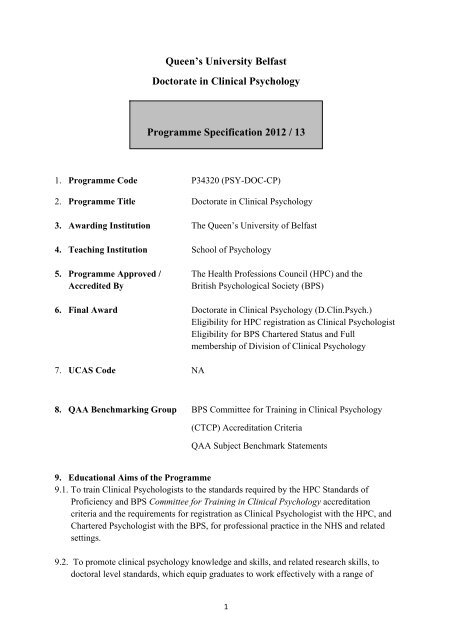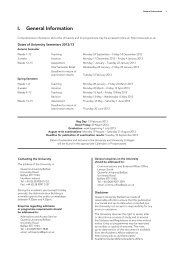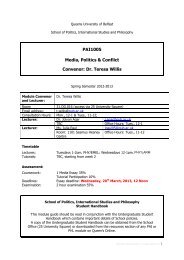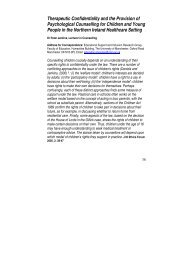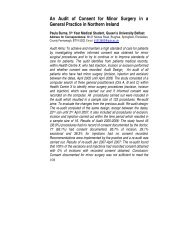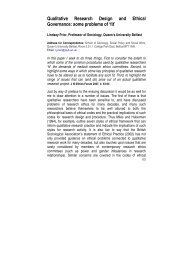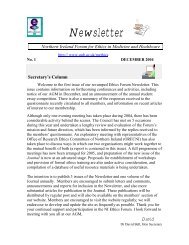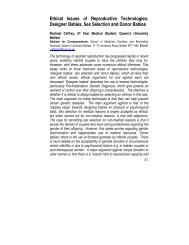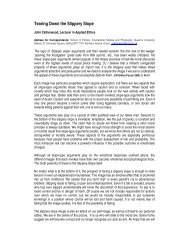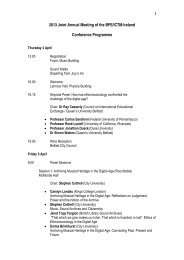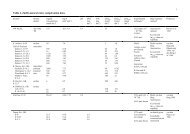Programme Specification 2012 / 13 - Queen's University Belfast
Programme Specification 2012 / 13 - Queen's University Belfast
Programme Specification 2012 / 13 - Queen's University Belfast
Create successful ePaper yourself
Turn your PDF publications into a flip-book with our unique Google optimized e-Paper software.
Queen’s <strong>University</strong> <strong>Belfast</strong><br />
Doctorate in Clinical Psychology<br />
<strong>Programme</strong> <strong>Specification</strong> <strong>2012</strong> / <strong>13</strong><br />
1. <strong>Programme</strong> Code P34320 (PSY-DOC-CP)<br />
2. <strong>Programme</strong> Title Doctorate in Clinical Psychology<br />
3. Awarding Institution The Queen’s <strong>University</strong> of <strong>Belfast</strong><br />
4. Teaching Institution School of Psychology<br />
5. <strong>Programme</strong> Approved / The Health Professions Council (HPC) and the<br />
Accredited By<br />
British Psychological Society (BPS)<br />
6. Final Award Doctorate in Clinical Psychology (D.Clin.Psych.)<br />
Eligibility for HPC registration as Clinical Psychologist<br />
Eligibility for BPS Chartered Status and Full<br />
membership of Division of Clinical Psychology<br />
7. UCAS Code NA<br />
8. QAA Benchmarking Group BPS Committee for Training in Clinical Psychology<br />
(CTCP) Accreditation Criteria<br />
QAA Subject Benchmark Statements<br />
9. Educational Aims of the <strong>Programme</strong><br />
9.1. To train Clinical Psychologists to the standards required by the HPC Standards of<br />
Proficiency and BPS Committee for Training in Clinical Psychology accreditation<br />
criteria and the requirements for registration as Clinical Psychologist with the HPC, and<br />
Chartered Psychologist with the BPS, for professional practice in the NHS and related<br />
settings.<br />
9.2. To promote clinical psychology knowledge and skills, and related research skills, to<br />
doctoral level standards, which equip graduates to work effectively with a range of<br />
1
clients, across the lifespan - with a range of acute and enduring, functional and organic,<br />
presentations - and in a range of settings from primary care to tertiary and residential<br />
services.<br />
9.3. To promote essential skills in psychological assessment utilising psychometric,<br />
neuropsychological, clinical interview and observational methods and with individuals,<br />
families and groups.<br />
9.4. To promote competence through academic learning and placement experience in at least<br />
two formal models of psychotherapy, one of which must come from the Cognitive<br />
Behavioural school. Graduates of the programme should also have an awareness of a<br />
range of therapeutic perspectives and be able to draw from and integrate such principles<br />
as appropriate.<br />
9.5. To promote a reflective, scientist-practitioner, approach to psychological assessment,<br />
formulation, intervention and evaluation. An ethos pervades the course of integrating<br />
psychological theory with practice, drawing from the evidence base and service user<br />
positions to inform practice, formal and informal audit of practice standards and<br />
contribution to the knowledge base through research activity.<br />
9.6. To promote knowledge and skills of consultation, leadership and multidisciplinary<br />
working which foster the capacity for indirect work to promote health and well-being.<br />
9.7. To promote doctoral level research knowledge and skills which will enable the graduate<br />
to critically engage with the evidence base of the profession as a contributor, as well as<br />
consumer.<br />
9.8. To promote personal awareness and development, in particular with respect to how<br />
personal and interpersonal factors and diversity of cultural and sub-cultural contexts,<br />
impact on therapeutic processes and professional practice.<br />
9.9. To foster the highest calibre of ethical practice in clinical work and research activities, in<br />
accordance with the HPC Guidance on Conduct and Ethics, BPS Code of Conduct,<br />
professional practice and statutory guidelines at national and regional levels.<br />
10. Criteria for Admission<br />
10.1. Applicants must possess, or expect to possess by admission to the course, at least a<br />
second class Honours degree (first division), or equivalent, which has been accredited<br />
by the British Psychological Society as conferring the Graduate Basis for Chartered<br />
Membership (GBC). Applicants with less than a 2.1 degree may apply IF they also<br />
possess higher degrees with distinct relevance to clinical psychology.<br />
2
10.2. Typically the ratio of applications to commissioned placed is 20:1. In recent years<br />
approximately 200 applications have been received. All application forms are rated by<br />
the shortlisting panel with regard to additional desirable criteria related to competencies<br />
of psychological knowledge and skills, personal development and competencies,<br />
interpersonal skills and research knowledge and skills. Ratings will be informed by<br />
evidence of academic and research training, clinical or other related experiences, which<br />
prepare the applicant for some of the challenges likely to be experienced in clinical<br />
training. The way in which the application form is completed (e.g. critical selfreflection<br />
skills, synthesis of competencies gained from experiences) also informs these<br />
ratings. Those shortlisted (typically 48) will be invited to attend a second selection<br />
stage, which assesses the same competencies but involving interview and other<br />
assessment exercises. Offers are made largely on the basis of selection ratings, but<br />
subject to satisfactory references, an occupational health assessment and criminal<br />
records checks.<br />
11. <strong>Programme</strong> Structure, Levels, Modules and Credits<br />
11.1. The minimum period of full-time study is three years and the maximum four years,<br />
excluding periods of suspended study. Accreditation of Prior Learning (APL)<br />
regulations will apply at the discretion of the institution. If gaps in training occur of<br />
two years or more (e.g. through extended leave or stepping off after Year 1), the<br />
trainee may be required to repeat modules or take contemporaneous modules from<br />
the live programme at the discretion of the Board of Examiners.<br />
11.2. There are 18 mandatory modules (total of 540 postgraduate CATs) which must be<br />
passed for the award of the Doctorate in Clinical Psychology (with the exception of<br />
the four placement modules of Year 2 and Year 3 where one failure is permitted).<br />
11.3. Academic, placement, research and personal and professional issues modules are<br />
taken at three levels – normally mapping onto three years of training. Progression<br />
across the three levels of training is contingent on successful completion of modules<br />
at the previous level. Modules vary in size to reflect different effort hours involved.<br />
See section two for more detailed information on modules.<br />
11.4. The academic modules are delivered at the university base and occur in blocks of<br />
varying sizes, at two stages of the year, supplemented by two academic days per<br />
week or fortnight, depending on stage of training.<br />
11.5. Following a year long foundation placement, trainees undertake four further six<br />
month placements in Year 2 and Year 3, within health service settings. These<br />
placements are crucial learning contexts for applying the knowledge base of clinical<br />
psychology to clinical presentations and challenges. Ongoing individual tutoring and<br />
supervision in clinical, personal, professional and research competencies occur<br />
throughout these placements. Learning outcomes need to be demonstrated with client<br />
3
groups across the lifespan (e.g. children, adults, older adults), who present with a<br />
variety of difficulties (e.g. acute to severe and enduring) and from a range of<br />
demographic backgrounds. Clinical practice must include experience with clients<br />
with significant levels of challenging behaviour, with a range of intellectual and<br />
communication abilities and with carers and families. Placements will take place in a<br />
variety of service delivery systems (e.g. in-patient/residential and out-patient,<br />
secondary healthcare and community/primary care) and will involve direct work,<br />
multidisciplinary work, indirect work and consultancy, drawing from one or more<br />
models of psychological therapy as specified. As placements involve the<br />
accumulation of clinical data for both case studies, service-related and the main<br />
research paper, placement modules are also classified as research components of<br />
training. However, they have a separate assessment structure where specific research<br />
skills are rated under an umbrella of evidenced based practice competencies.<br />
11.6. Research modules and associated activity take place within the academic programme<br />
across all stages, on placement and through research fieldwork. Set days are<br />
circumscribed for research activity and these increase as the course progresses.<br />
11.7. Personal and professional issues training takes place as taught sessions within the<br />
academic programme, through participation in reflective practice and personal<br />
awareness groups, through clinical and research supervision and through mentoring<br />
by the Year Tutor.<br />
11.8. Level One modules:<br />
Code Title Pre-Requisites CATs<br />
PSY9011 Clinical Presentations of Adult and Childhood None 15<br />
PSY9012 Psychological Assessment None 10<br />
PSY90<strong>13</strong> Psychological Therapies 1 None 20<br />
PSY9014 Personal and Professional Development 1 None 15<br />
PSY9015 Applied Research 1 None 60<br />
PSY9016 Placement 1– Foundations of Psychological<br />
Therapy<br />
None 60<br />
4
11.9. Level Two modules<br />
Code Title Pre-Requisites CATs<br />
PSY9017 Specialist Clinical Presentations PSY9011-9016 10<br />
PSY9018 Assessment and Formulation PSY9011-9016 15<br />
PSY9019 Psychological Therapies 2 PSY9011-9016 20<br />
PSY9020 Personal and Professional Development 2 PSY9011-9016 15<br />
PSY9021 Applied Research 2 PSY9011-9016 20<br />
PSY9022 Placement 2 PSY9011-9016 50<br />
PSY9023 Placement 3 PSY9011-9016 50<br />
11.10. Level Three modules:<br />
Code Title Pre-Requisites CATs<br />
PSY9024 Advanced Psychological Interventions PSY9011-9023 10<br />
PSY9025 Personal and Professional Development 3 PSY9011-9023 10<br />
PSY9026 Applied Research 3 PSY9011-9023 60<br />
PSY9027 Placement 4 – Specialist Services 1 PSY9011-9023 50<br />
PSY9028 Placement 5 – Specialist Services 2 PSY9011-9023 50<br />
12. Awards, Credits and Progression of Learning Outcomes<br />
12.1. Examination and Assessment<br />
To be awarded the Doctorate in Clinical Psychology trainees must pass ALL modules.<br />
A failed module may be re-taken once only with the exception of the placement<br />
modules where candidates are permitted only one failed placement module at first<br />
attempt. At the discretion of the Board of Examiners, candidates may be permitted to<br />
carry ONE failed placement (with the exception of the year long foundation placement)<br />
IF the failed competencies can be successfully and reliably demonstrated in subsequent<br />
placement modules. Units of assessment associated with each module are described in<br />
section two of the handbook.<br />
To progress to level 2 of the course, trainees must pass ALL modules of level 1. A<br />
failed academic, research or personal and professional issues module may be re-taken,<br />
ONCE only, by re-submitting the associated unit of assessment and (if appropriate) reattending<br />
module sessions. However, if all three academic modules are failed on the<br />
5
first submission of the unit of assessment course failure will be recommended at this<br />
stage.<br />
To progress to level 3 of the course trainees must pass the academic, placement,<br />
research and personal and professional issues modules of level 2. A failed module may<br />
normally be re-taken ONCE only by re-submitting the associated unit(s) of assessment<br />
and (if appropriate) re-attending module sessions. As noted above, candidates may be<br />
permitted to carry ONE failed placement in years 2-3 IF the failed competencies can be<br />
successfully and reliably demonstrated in subsequent placement modules.<br />
At the end of level 3, trainees must present TWO bound theses in the format of research<br />
portfolios for assessment. The first volume must contain the previously assessed four<br />
clinical reports and service-related research. This is to enable the external examiner to<br />
review the student’s work over the three years but is not normally examined. The<br />
second volume should contain the systematic literature review and the empirical paper<br />
related to the Applied Research 3 module and is directly examined by the external<br />
examiner who will be a subject specialist in the area of applied psychological research.<br />
Candidates who do not pass Applied Research 3 with either a “pass”, “pass with minor<br />
corrections” or “pass with minor revisions” may be graded as either “revise and<br />
resubmit” (in which case they will have up to 12 months to resubmit), “Master’s degree<br />
awarded” or “no degree awarded”. Further details of these possible outcomes are<br />
outlined in the Research Handbook.<br />
12.2. Fall Back award – Masters in Applied Psychology<br />
Should trainees not pass sufficient modules to be awarded the Doctorate, a Masters in<br />
Applied Psychology may be awarded depending on the number of modules passed and<br />
CATs points accrued. At least 180 CATs points must be accrued in this instance. This<br />
award will be at the discretion of the <strong>University</strong> and does NOT confer eligibility to<br />
apply for HPC registration.<br />
12.3. Intended Learning Outcomes<br />
Many of the subject-specific learning outcomes, required of programmes by the<br />
Committee for Training in Clinical Psychology (CTCP) accreditation criteria, are<br />
operationalised in the appropriate module descriptions (e.g. related to research, clinical<br />
skills etc.). However, there are overarching learning outcomes which are summarised<br />
here. At completion of the Doctoral programme, it is intended that trainees will have<br />
the skills, knowledge and values to:<br />
<br />
Develop working alliances with clients (individuals, carers, families,<br />
services etc.), in order to carry out psychological assessment, develop a<br />
formulation based on psychological theory and knowledge, carry out<br />
psychological interventions, evaluate their work and communicate<br />
effectively with relevant stakeholders (orally, electronically and in writing).<br />
6
Work effectively with clients with a range of clinical presentations, across<br />
the lifespan and within a variety of statutory settings as specified in 11.5<br />
above. Included is the capacity to work effectively with systems relevant to<br />
clients (e.g. voluntary services, user-led systems).<br />
Work effectively with clients from a diverse range of backgrounds,<br />
understanding and respecting the impact of difference and diversity.<br />
Work in a range of indirect ways (e.g. through consultation,<br />
multidisciplinary and leadership) to improve psychological aspects of<br />
health and well-being.<br />
Conduct research, consistent with Doctorate-Level QAA descriptors, which<br />
enables the profession to develop its knowledge base and monitor and<br />
improve the effectiveness of its work.<br />
Work in a critically reflective manner, with a developed sense of personal<br />
awareness (e.g. with regard to parallel processes and how personal and<br />
interpersonal factors impact on practice) and with regard to how sociocultural<br />
contexts impinge on work undertaken.<br />
These learning outcomes may be further specified under the <strong>University</strong> system of<br />
defining learning outcomes with respect to Knowledge and Understanding, Subject-<br />
Specific Skills, Cognitive Skills and Transferrable Skills. These are further outlined,<br />
below together with associated teaching methods and assessment processes:<br />
Knowledge and Understanding: Following successful completion of the programme<br />
trainees will have doctoral level knowledge and understanding of:<br />
KU1<br />
KU2<br />
KU3<br />
KU4<br />
Psychological theory and evidence, related to the clinical presentations of<br />
various specialist client groups, and across the lifespan, which underpins<br />
clinical practice.<br />
At least two formal models of psychotherapy, their evidence base, protocols<br />
and implications for psychological assessment, formulation, intervention and<br />
evaluation.<br />
Research design and analysis, application and evaluation.<br />
Personal, professional and ethical issues as they pertain to the practice of<br />
clinical psychology.<br />
7
Subject Specific Skills: Following successful completion of the programme trainees<br />
will have doctoral level skills in:<br />
SS1<br />
SS2<br />
SS3<br />
SS4<br />
SS5<br />
SS6<br />
SS7<br />
Psychological assessment – development of working alliances; capacity to<br />
choose, use and interpret findings from a broad range of assessment protocols<br />
including interview, psychometric and observational methods; conduct<br />
appropriate risk assessment; assess within socio-cultural contexts.<br />
Psychological formulation – create a psychological formulation of presenting<br />
problems which integrates information from assessment, utilising a coherent<br />
theoretical framework and incorporating interpersonal, socio-cultural and<br />
biological factors; communicate to clients and relevant others in a way which<br />
is helpful and assists with planning interventions; capacity to revise in light of<br />
intervention outcomes and new information.<br />
Psychological intervention – implement a formulation based plan of<br />
intervention in appropriate collaboration with clients, carers, services; utilise<br />
as appropriate at least two formal models of psychological therapy from the<br />
cognitive behavioural school and one other; carry out such interventions when<br />
working with key clinical presentations of adulthood (e.g. depression, anxiety,<br />
trauma, psychosis), childhood (e.g. mood, conduct, developmental) and<br />
specialist populations (e.g. neurological, dementia, challenging behaviours,<br />
forensic); promote therapeutic programmes through indirect working (e.g.<br />
with families, carers, multidisciplinary teams).<br />
Evaluation of psychological intervention – capacity to select appropriate<br />
methods to evaluate effectiveness, acceptability and broader impact of<br />
interventions; skills in formal and informal audit procedures.<br />
Working in a critically reflective and self-aware way – capacity to reflect on<br />
how personal processes impact on professional practice; formulate personal<br />
and professional development plans; use supervision and critical feedback to<br />
reflect on practice; develop strategies to handle the emotional impact of<br />
practice with awareness of boundary issues.<br />
Ethical decision making in complex clinical and research contexts with the<br />
capacity to ensure informed consent underpins engagement with clients and<br />
research participants.<br />
Communication and teaching of psychological skills and opinion – adapting to<br />
different recipient needs; providing expert opinion in formal and informal<br />
settings; providing appropriate level of supervision, training and leadership.<br />
8
Cognitive Skills: Following successful completion of the programme trainees will be<br />
able to:<br />
CS1<br />
CS2<br />
CS3<br />
Select and synthesise prior knowledge and experience in order to apply this<br />
critically and creatively in complex and novel clinical and research situations.<br />
Think in a critical, reflective and evaluative way in order to make informed<br />
judgements on complex issues and in specialist fields, often in the absence of<br />
complete information.<br />
Think critically and reflectively with regards to personal and professional<br />
development.<br />
Transferrable Skills: Following successful completion of the programme trainees<br />
will be able to:<br />
TS1<br />
TS2<br />
TS3<br />
TS4<br />
Exercise personal responsibility and largely autonomous initiative in complex<br />
and unpredictable situations in professional practice.<br />
Communicate psychologically-informed ideas and conclusions to specialist<br />
and non-specialist audiences<br />
Manifest doctoral level research skills – critical appraisal of knowledge base;<br />
form research partnerships; conduct service related applicable research;<br />
conduct conceptual and generalisable applied research to a level which merits<br />
publication; disseminate and report in appropriate research outputs.<br />
Adapt practice to a range of organisational contexts; provide appropriate levels<br />
of supervision and leadership.<br />
The learning methods by which these competencies are promoted, together with<br />
assessment methods used by the programme to evaluate them, are outlined below.<br />
Further specification with respect to how these are distributed across the 18 individual<br />
modules are contained in the module descriptions.<br />
9
Learning Methods<br />
Assessment Methods<br />
<br />
Lectures<br />
<br />
Critical and systematic literature reviews<br />
<br />
<br />
Seminars and tutorials<br />
Workshops<br />
Directed and self-directed reading –<br />
textbooks and journals<br />
<br />
<br />
<br />
<br />
Problem based and experiential learning<br />
exercises<br />
Video analysis and role-plays<br />
Clinical practice and supervision<br />
Research activity and supervision<br />
<br />
<br />
<br />
<br />
Reports of clinical activity including<br />
case studies, single participant<br />
experimental designs, process analysis<br />
and reports of psychological assessment<br />
and formulation<br />
Reflective practice reports<br />
Examinations and class test<br />
Clinical and research supervisor ratings<br />
of specified clinical and research<br />
competencies demonstrated on<br />
placement and through research activity<br />
<br />
Personal mentoring<br />
<br />
Service-related research report<br />
<br />
Reflective practice and personal<br />
awareness groups<br />
<br />
<br />
Research proposal<br />
Research portfolio of two papers in<br />
format for publication<br />
<strong>13</strong>. Support for Students and their Learning<br />
<strong>13</strong>.1. The course is based within the School of Psychology. There is one dedicated teaching<br />
room (with access to others) and all are well-equipped with audio-visual resources.<br />
Trainees have access to networked personal computers within the School, at the<br />
Postgraduate Centre, and in Library services across the campus. A specialist library of<br />
books, tests and other resources is available within the department. On placement in<br />
the Health Service and elsewhere, trainees normally have access to office space and<br />
facilities, and other resources within the clinical department.<br />
<strong>13</strong>.2. There are approximately 250 Clinical Psychologists practising in Northern Ireland and<br />
beyond, who support the training of Clinical Psychologists at Queen’s by offering<br />
supervised clinical placements to trainees on the course. Located within the School of<br />
Psychology, the course also enjoys the support of the academic Psychology<br />
community at Queen’s, who make contributions to both teaching and the supervision<br />
of research projects.<br />
<strong>13</strong>.3. Given the emphasis in training on Personal and Professional Development, there are<br />
extensive mechanisms in place to support this. These include informal and formal<br />
10
appraisal meetings with the Year Tutor and other members of the Course Team, a<br />
supervisory relationship which attends to personal support and development whilst the<br />
trainee is on placement, and regular and confidential Personal Awareness Groups<br />
facilitated by a therapist not involved in the evaluation of the trainee. A mentor<br />
programme is also available which allows Year 3 Trainees experience at providing<br />
mentoring support to Year 1 Trainees. Trainees are afforded further personal support<br />
by members of the Course Team and others as appropriate.<br />
14. Regulation of Standards<br />
14.1. The programme is regulated by the Clinical Psychology Board of Studies.<br />
Representatives from all stakeholders (university staff, clinical supervisors, service<br />
managers, trainees, service users and commissioners) contribute to the work of the<br />
Board either directly, and/or through participation in the various sub-committees and<br />
panels (curriculum, research, placement, selection, service user). As noted, trainees<br />
participate in these committees, but their views are also elicited through various audits<br />
of learning and clinical experiences. The Board of Examiners is responsible for<br />
regulating assessment and evaluation standards and for considering the progress of<br />
trainees on the course with respect to these standards. Regular audits of standards<br />
across all areas of training take place and are reported to the Board of Studies and / or<br />
the committee responsible for the Annual Review of that component of the<br />
programme.<br />
14.2. External regulation of standards takes place in a number of ways. The External<br />
Examiners to the course annually monitor course practices to ensure that regional<br />
standards of training are consistent with national levels. In addition they advise the<br />
Board of Examiners on trainee progress by direct assessment, moderation of marking,<br />
and monitoring of assessment standards. They are full members of the Board of<br />
Examiners and report directly to the <strong>University</strong> on standards and practices etc.<br />
14.3. The programme is regulated by the Health Professions Council and on completion of<br />
the course trainees are eligible to apply for registration with the HPC. The course is<br />
subject to approval visits from the HPC and yearly monitoring. Graduates of the<br />
programme must be approved by the HPC to enter the register of Practitioner Clinical<br />
Psychologists, now required legally to practice. The course is reviewed with regard<br />
to standards, along with all other degree pathways in the School, by QAA for Higher<br />
Education. In addition, the professional body - The British Psychological Society -<br />
accredit the programme on a five yearly basis. This process not only ensures that the<br />
programme maintains the standards of the profession required for its graduates to<br />
attain Chartered status, but provides regular opportunities for quality enhancement<br />
through external peer review.<br />
11
15. Indicators of Quality and Standards<br />
15.1. Successful HPC approval (2011) and BPS accreditation (2011) visits represent<br />
independent validation of standards. At the last BPS accreditation visit in February<br />
2011 the programme was commended for the following practices in particular:<br />
<br />
<br />
<br />
<br />
<br />
<br />
<br />
<br />
The creation of the Diploma programme to enhance the developing workforce within<br />
Northern Ireland and the novel and innovative development of an accreditation of<br />
prior learning (APL) route for training, which is continually evolving in response to<br />
trainees’ experience and feedback from a range of sources.<br />
The strength of the research output of the programme both through the research<br />
active staff and as evidenced through the high publication rate of the trainees on the<br />
programme, and the outreach work to local trusts and clinical psychologists to<br />
engage them in research, which is strongly underpinned by a strong research strategy<br />
and strength of leadership by the research Co-ordinator.<br />
The programme brings a very strong strategic value to the profession of clinical<br />
psychology within the region and enjoys a true sense of loyalty from its service<br />
partners and commissioners.<br />
The programme enjoys positive relationships with local clinicians who show a real<br />
enthusiasm and commitment for the programme and the provision of placement<br />
opportunities to train future professionals, and who are committed to offering highquality<br />
training.<br />
The truly cohesive, fully integrated, efficient and healthy functioning programme<br />
team, underpinned by strength in the programme’s leadership. This clear leadership<br />
supports colleagues to take leadership within their area of responsibility on the<br />
programme. The facilitation of an egalitarian and inclusive atmosphere through use<br />
of the staff reflective practice group is to be commended.<br />
The programme’s Diversity strategy and the widening participation of service user<br />
involvement in all aspects of the programme.<br />
The extensive review of applicant information conducted by the programme team, the<br />
monitoring of the programme’s Equality and Diversity data, the plans put in place to<br />
widen access to the programme, and the way in which these initiatives are being<br />
taken forward through research and practice is commendable.<br />
The Quality Assurance processes undertaken by the team and the thirst to continually<br />
enhance and develop the programme, the strategic involvement and awareness of the<br />
needs of the Division of Clinical Psychology Special Interest Groups and Faculties<br />
and the way in which the programme feeds back to its stakeholders about changes<br />
made.<br />
15.2. In their summary exit reports (2009) our last cohort of external examiners<br />
commended the following aspects of the course in particular:<br />
“The standard of students’ work is at least as high as, if not higher than, other<br />
comparable programmes…The programme at Queen’s is very organised and of a<br />
high standard” (Dr Cynthia Graham, <strong>University</strong> of Oxford).<br />
“Very high standard reflecting aims and outcomes…educational aims achieved to a<br />
high standard…very thorough and rigorous assessment procedures…High standard<br />
12
overall (slightly higher than UK standard)” (Dr Robert Jones, <strong>University</strong> College<br />
Wales)<br />
“The provision within the programme appropriately reflects the aims of the<br />
programme…The range of teaching and assessment methods are excellent and<br />
facilitate student learning…The theses were of a comparably excellent standard to<br />
previous years…preparation for the viva was excellent among students.” (Dr David<br />
Hevey, Trinity College Dublin).<br />
<strong>13</strong>


